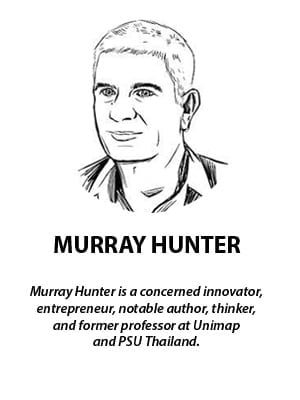FMT:
Why PAS cannot be defeated in the rural heartlands
Unlike the Islamist party, Umno, PKR and Amanah have no natural base in rural Malaysia.

To the Malays from PAS, Islam is much more than a religion. It is a way of life.
This way of life carries with it the prospect of either being “saved” or “damned” in the afterlife. This governs the morals and ethics of living within Islam, making conducting oneself according to the tenets of Islam the mission of life here on earth.
In this context, no one can tell PAS Malays they are wrong. In fact, from their perspective, those who do are themselves misguided.
The Iranian revolution back in May 1979 offers inspiration for what could be achieved in Malaysia.
A true Islamic government is one of virtue and justice. What PAS Malays see today is a government of misled politicians run by corrupt rentseekers, who govern for self-interest.
PAS’ rural Malay support live in kampungs. They share the same visions and have over several generations tried to make their respective kampungs reflect their values. They have their own schools, mosques, madrasahs, and their own shops and businesses.
PAS Malays live in a society reinforced by mutual community assurances, which are extremely powerful, and are inspired by the party’s ulama and its community leaders.
Institutions like the monarchy are seen as necessary by tradition, but the real leadership today is the ulama. Their interpretation of the world has seen the Malays drastically modify their culture, incorporating “Arabism” both in dress and through language.
This separates PAS Malays from the rest of society, both visually and verbally. They live together in group spirituality. Some might call this “group neurosis”. An attack on their beliefs is an attack on Islam, which they will defend.
They see an outside world riddled with corruption. Mixing with such outsiders is tempting corruption. These include other Malays, who are viewed with caution, and even suspicion. They are seen as the ones who have strayed from the ummah, or fold of Muslims. There is no respect for them.
Most political leaders from Umno and PKR live in towns. They are perceived as different, with completely different beliefs and value sets. They are seen as people seeking self-benefit and motivated by greed, thus straying from the basic values of Islam. That is why messages from Umno and PKR politicians fall on deaf ears in the rural heartlands.
Both Umno and PKR have no natural base in the rural heartlands. They visit but have no permanent presence there. They are deemed outsiders. Amanah lost its connection with the kampungs when they broke away from PAS. It is primarily a town-based party.
Thus, when it comes to election campaigns, PAS has a deep local grassroot organisation within the kampungs, which fringe into the towns. Umno, PKR, and Amanah have campaign offices, set up for the duration of election campaigns, only to disappear the day after an election. PAS offices are there all year round.
Consequently, Umno, PKR, and Amanah are disconnected from the electorate. They just do not disseminate messages that resonate with voters in the rural heartlands.
This partly explains why Nurul Izzah Anwar lost the long-time family held seat of Permatang Pauh, and Saifuddin Nasution Ismail his Kulim-Bandar Baharu seat, in the Dewan Rakyat.
Mega projects, five-year plans, and new government initiatives are totally irrelevant to voters in the rural heartlands.
Back in the 1980s, I was asked by a resident of Kuala Nerang in Kedah how the Kuala Lumpur City Centre (KLCC) would benefit their lives. The whole project was irrelevant to them. Inversely, for others, the KLCC became a symbol of national pride.
PAS Malays have a completely different value set to urban dwellers that is grossly misunderstood. Those dismissing the beliefs and values of the PAS Malays only strengthen their resolve.
The problem here is that many Malaysians look down upon PAS Malays for what they believe in. Such contempt has caused a massive divide in Malaysia today. This is what has enabled PAS to become much stronger.
All sustainable political movements must be grounded within the community. No longer defenders of Malay rights, Umno has gone from holding 88 seats in 1995, to just 26 seats today.
The spirit of PKR lives in coffeeshops around major urban areas. There is no real kampung movement. PKR’s hardcore support base from the party’s “Reformasi” days is now aged, and disappointed.
Pakatan Harapan’s aggregate vote only went from 5.5 million to 5.8 million votes over the last two general elections, even with the Undi 18 vote in 2022. Pakatan must do a lot of soul searching here.
Umno was once a kampung-based party. However, the development of money politics disenfranchised the kampung membership. The party is paying dearly for this now.
PAS is a community-based party. It has been building communities for more than 50 years. Consequently, PAS is here to stay and will be a major influence upon Malaysian politics for years to come.
***
kt comments:
Alas, Murray Hunter neglected to mention today's PAS leaders who are conveyed by Mercedes, Audi, Vellfire, Ford Ranger Predator, and who live in luxury with sky-high multiple income and glut on lobsters, etc. Worse, these leaders lie through their teeth and associate in regular contradictions in accordance with their current political interests.
OTOH, Murray Hunter has not been wrong entirely in his article as he postulated the mindset of the PAS kampong supporters who, unfortunately, have been beguiled by the duplicities of their opportunistic leaders, dressed in thobe but some with hearts of sheer avarice, lust, hatred and malice.
"Mega projects, five-year plans, and new government initiatives are totally irrelevant to voters in the rural heartlands."
ReplyDeleteComment: I just have this to add, "these rural folks deserve the leaders they follow" and correspondingly, face eg 30 to 40 years before their water woes are resolved like in Kelantan.